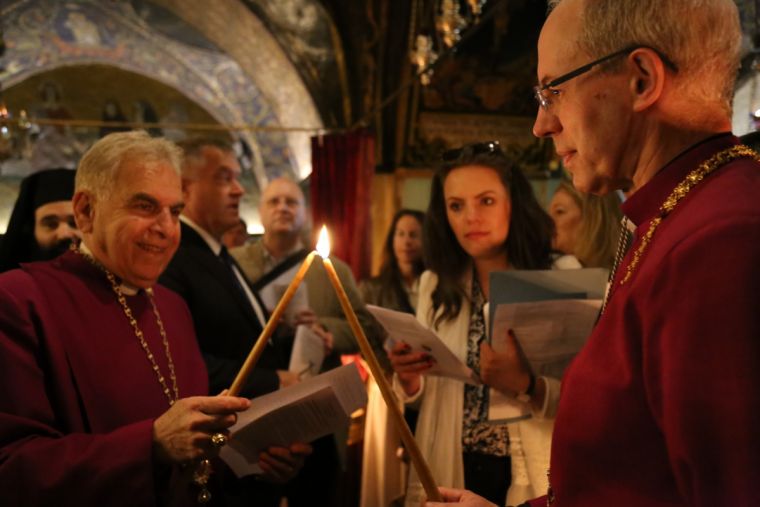Analysis: Prayer, politics and unlikely success as Justin Welby completes 12-day tour of the Holy Land

For a man who has endured more than 80 meetings over 12 days during what has been his longest official visit as Archbishop of Canterbury in probably the most complicated region in the world, Justin Welby was in remarkably good spirits as he ended his tour of the Holy Land this afternoon.
Welby looked visibly relieved as he laughed and joked with his team over lunch of salads, grilled lamb and traditional lemonade at The Old Man and the Sea restaurant in the Arab coastal town of Jaffa.
As well he might. For Welby, who doesn't like having spare time on his hands from the minute he gets up to pray at 5am, made good use of every hour on a trip which was more than a year in the planning.
His itinerary, which in the end included a surprise trip to Gaza, allowed him successfully to walk the tightrope of politics between Israel and the Palestinians, the two sides of the most apparently intractable of conflicts.
And as a pilgrim and Church leader, he managed to reinforce the role of Christians as peacemakers in this holy but troubled land, as well as showing what one senior aide calls his own considerable 'convening power'.
As the Archbishop of Jerusalem, Suheil Dawani, told Christian Today: 'This has been a successful visit in all ways: from a spiritual point of view, to a humanitarian one, and also in terms of interfaith.'
Dawani praised Welby for raising fearlessly the plight of Christians with leaders here, including both Israel's Prime Minister Benjamin Netanyahu and the Palestinian President Mahmoud Abbas.
It is a sign of Welby's authority that both figures spent an hour with him, and a sign of his skill that both meetings were by all accounts genuinely warm and positive.
They came at what Welby himself has called a 'moment of opportunity' when it comes to a potential deal between the two sides, with Donald Trump arriving in the region later this month.
Welby sensed that not only Abbas, who surprised the Archbishop by smoking during their meeting, but also Netanyahu wants peace, contrary to conventional wisdom among some here and in the UK.
Indeed the Lambeth Palace team was impressed by Netanyahu and, even more extraordinarily, the Israelis are not complaining about any aspect of the trip, despite having tried 'hard' to stop Welby from visiting Hebron during one of several excursions into the West Bank (and, according to one theory, putting the controversial settlers there on 'lockdown' for the day).
As well as Hebron, Bethlehem, Gaza and Jordan, where Welby heard from despairing Palestinians and refugees, Welby balanced the trip with visits to the Western Wall and Yad Vashem Holocaust memorial museum with the UK's Chief Rabbi, Ephraim Mervis, and a kibbutz in the Galilee, where Welby had a solitary day off with his wife Caroline, later joking that he 'could get used' to Shabbat.
In reality though, there was barely any respite on this trip, as he was pulled in every direction while he listened intently to disparate voices from across the Holy Land.
Yet his appetite for engaging with the region remains not only undiminished but enhanced.
In the second half of his trip, Welby sensibly adopted the mantra that the more you come here, the less you know. But the truth is that he comes away hugely more informed about the facts on the ground and ready to take up the cause of minorities in the region both in the House of Lords and elsewhere.
Lambeth Palace is already planning round-table discussions and symposiums on what Welby calls the 'unfinished business' of the Balfour Declaration whose centenary is later this year. Sarah Snyder, his impressive head of reconciliation who applied for the job on the condition that it was outward looking towards the world, and not introspective towards internal Anglican disputes over sexuality, and who has spent time with both Hamas and Israeli settlers, is returning to the region in July. And there is talk of Welby himself coming back in the next couple of years.
Welby first came to the Holy Land with Caroline on his honeymoon at the turn of 1979 and 1980. Since then, much has changed, including his own growing 'sense of place' as a pilgrim appreciating the Holy Sites, as he told Christian Today earlier this week.
Whether, though, anything will change on the political front by the time he returns, remains to be seen.
As a Christian who believes in the renewing power of the Resurrection, Welby is a natural optimist and is beginning to be a highly respected voice in the Middle East. Nonetheless, he is acutely aware of the limits to what he can do.
But as he left for Ben Gurion airport this afternoon, Welby was planning to permit himself a glass of champagne after he boards the British Airways flight home.
He can be confident that it is well deserved.











